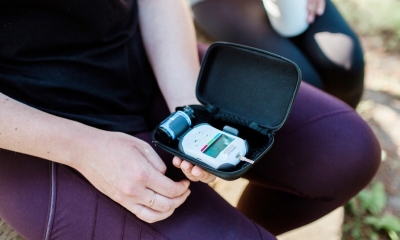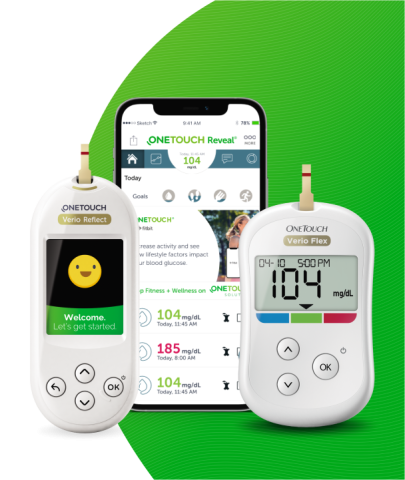-
Products

-
Accessories

-
OneTouch Verio® Control Solution

-
OneTouch Ultra Plus™ Control Solution

-
Carry Cases

-
Mobile
App
-
Getting
Started
-
Learn

-
Customer
Support
Gestational Diabetes

What causes gestational diabetes?
Doctors don't know exactly why some women develop gestational diabetes, but they have some clues.
The placenta provides nutrients and oxygen to your baby as it grows. Hormones from the placenta help the baby develop, but these hormones can also diminish the action of insulin. As the placenta grows, more hormones are produced and the insulin resistance increases. If your body is unable to make enough insulin to overcome the effect of placental hormones, the result is gestational diabetes.
Some women are at higher risk for developing gestational diabetes, including those:
- who were overweight before pregnancy (BMI of 30 or higher)
- who had a baby weighing more than 9 pounds at birth in a previous pregnancy
- who are older than 25 years of age
- with a history of gestational diabetes
- with a family history of diabetes
- of African‐American, Asian, Hispanic or Native American descent
How is gestational diabetes diagnosed?
It is recommended that women be screened for gestational diabetes during their pregnancy. If you are at high risk for developing gestational diabetes, your doctor may check earlier and/or more than once during your pregnancy.
The screening for gestational diabetes involves drinking a glucose beverage provided by your doctor, followed by a blood test one hour later to measure your blood sugar level. The one-hour test is a screening. If abnormal, higher than 190 mg/dL, it is followed at a later date by a 3-hour test. If gestational diabetes is confirmed, your doctor should talk to you about a treatment plan.
Why is it important to treat gestational diabetes?
It’s important to treat gestational diabetes as soon as it is diagnosed for your health and your baby’s health. Risks associated with gestational diabetes include:
- An increased chance of delivering a large baby weighing 9 pounds (4 kg) or more, a condition known as macrosomia, which can lead to:
- difficulty and injury during vaginal birth, or
- needing a cesarean section (C‐section)
- A high risk for pre‐term birth and the possibility of breathing problems (respiratory distress) for your baby
- A high risk for low blood sugar (hypoglycemia) in your baby soon after delivery
- A higher chance of preeclampsia and high blood pressure for you
Following your doctor’s care plan and managing your gestational diabetes carefully can help greatly reduce the risk for developing these complications.
What can you expect when diagnosed with gestational diabetes?
If you are diagnosed with gestational diabetes:
- Your doctor may recommend a healthy, carbohydrate‐controlled diet and exercise. In many cases, these steps will be enough to manage your blood sugar levels for the rest of your pregnancy.
- You may need to work with a registered dietitian to create a healthy eating plan. The dietitian can teach you how to manage the amount and types of carbohydrates you eat to help control your blood sugar levels while still meeting your pregnancy needs. You may also be asked to keep a food journal and track your weight.
- You may need to check your blood sugar at home, using a blood glucose meter. Ask your doctor or diabetes educator to recommend a blood glucose meter that is right for you. Testing and tracking your blood sugar will help you and your healthcare professionals manage your gestational diabetes.
- It is common to have to check your blood sugar four or more times daily during pregnancy, usually fasting and then 1 to 2 hours after meals. Your doctor or healthcare professional will tell you your blood sugar target ranges and how often to check. Don’t forget to keep a record of your blood sugar readings, including when you checked, your reading, and whether it was before or after eating, including how long after eating.
- Gentle exercise during pregnancy will help your body use its own insulin better and help control your blood sugar levels. Types of exercises pregnant women can safely enjoy include brisk walking and swimming. Talk to your healthcare professionals and get guidance for safe exercise with pregnancy.
At your obstetrician visits, your blood pressure and urine may be checked. Your doctor may discuss your blood sugar readings, as well as what you have been eating, how much you have been exercising, and how much weight you have gained. Your growing baby will also be monitored closely. All of this will help determine if your treatment plan for gestational diabetes is working and when changes may be needed.
If changing your eating plan and adding exercise do not keep your blood sugar levels in your target ranges, your doctor may prescribe diabetes medicines (pills or insulin) for the rest of your pregnancy.
Taking medications (tablets/pills, insulin)
If your body is not able to make enough insulin on its own to handle what it needs as the baby grows, your doctor may prescribe pills or insulin. Once you’ve given birth, chances are you will no longer need to take the diabetes medication, but it is important to follow your doctor’s recommendations to protect both you and your baby.
If your doctor prescribes insulin, it means you will take it by injection or by using a device, such as an insulin pump. A family member can learn how to do this with you and help you take your insulin as prescribed. Your healthcare team and doctor will work with you to develop your treatment plan, including when and how much insulin to take. This plan will be updated as needed over the remaining course of your pregnancy.
Women who develop gestational diabetes during pregnancy have a higher risk for developing Type 2 diabetes later in life. After delivery, most women’s blood sugar levels will return to normal, but it’s important to follow up with your healthcare professional after pregnancy and inquire about regular screenings.
Sources:
Hopkins Medicine. Gestational Diabetes Mellitus. Online version accessed May 26, 2022
Cleveland Clinic. Gestational Diabetes. Online version accessed May 26, 2022
Mayo Clinic. Gestational Diabetes Symptoms and Causes. Online version accessed May 6, 2022
Mayo Clinic. Gestational Diabetes Diagnoses and Treatment. Online version accessed May 6, 2022
Related articles
US-VRF-1900004








